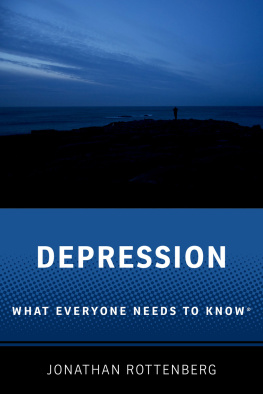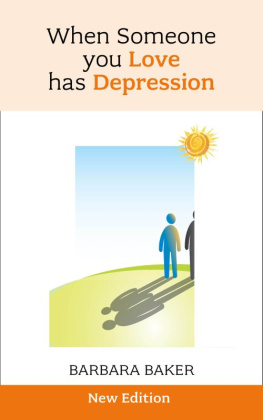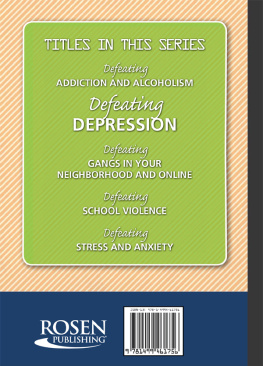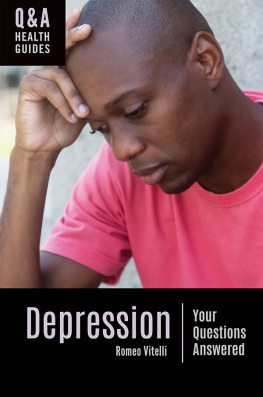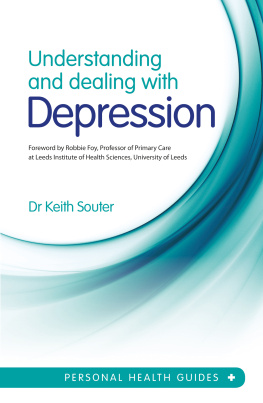Advance praise for Depression: What Everyone Needs to Know
For anyone seeking information about the nature of depression, why it happens, and how it can be assessed and treated, this is your book. Even for those who already know a lot about depression, the comprehensive up-to-date information and the beautiful writing style will make this a bookshelf favorite.
Sheri L. Johnson, PhD, Professor of Psychology, Director, CALM Program, University of California Berkeley
This book is a must-read for anyone interested in and/or affected by depression. Written by a foremost expert on depression theories and treatment, it combines the presentation of cutting-edge knowledge with thoughtful and empathic descriptions of the main symptoms and treatment approaches. The book not only provides important information, it also offers hope and practical advice to people confronted with the disorder. It should be of great interest to anyone interested in understanding and treating mental disorders.
Jutta Joormann, PhD, Professor of Psychology, Department of Psychology, Yale University

Oxford University Press is a department of the University of Oxford. It furthers the Universitys objective of excellence in research, scholarship, and education by publishing worldwide. Oxford is a registered trade mark of Oxford University Press in the UK and certain other countries.
What Everyone Needs to Know is a registered trademark of
Oxford University Press.
Published in the United States of America by Oxford University Press
198 Madison Avenue, New York, NY 10016, United States of America.
Oxford University Press 2022
All rights reserved. No part of this publication may be reproduced, stored in a retrieval system, or transmitted, in any form or by any means, without the prior permission in writing of Oxford University Press, or as expressly permitted by law, by license, or under terms agreed with the appropriate reproduction rights organization. Inquiries concerning reproduction outside the scope of the above should be sent to the Rights Department, Oxford University Press, at the address above.
You must not circulate this work in any other form and you must impose this same condition on any acquirer.
Library of Congress Cataloging-in-Publication Data
Names: Rottenberg, Jonathan, author.
Title: Depression : what everyone needs to know / Jonathan Rottenberg.
Description: New York : Oxford University Press, 2022. |
Series: What everyone needs to know | Includes bibliographical
references and index.
Identifiers: LCCN 2020058294 (print) | LCCN 2020058295 (ebook) |
ISBN 9780190083144 (paperback) | ISBN 9780190083151 (hardback) |
ISBN 9780190083175 (epub) | ISBN 9780197586808
Subjects: LCSH: Depression, Mental. | Depression, Mental
Treatment. | Mood (Psychology)
Classification: LCC RC537 .R6584 2021 (print) | LCC RC537 (ebook) |
DDC 616.85/27dc23
LC record available at https://lccn.loc.gov/2020058294
LC ebook record available at https://lccn.loc.gov/2020058295
For Ollie and Cy
Contents
I express my gratitude to Sarah Harrington at Oxford University Press for her care and support with the manuscript. Mary Kleinman helped greatly with research. Members of the Mood and Emotion Laboratory provided early feedback on chapters. Rana Rottenberg provided maternal care and copyediting. Laura Reiley provided nourishment of all kinds.
A surprisingly difficult question.
Depression has spawned thousands of books. Yet one enduring view is that depression is somehow beyond words (at least when we try to describe the experience). I believe that launching more words (and even another book) about depression is not a futile or vain effort. But lets grant, the subject is full of paradoxes.
Depression is at once intensely private and the most public of problems. People who go through depression are cut off from others, even as they experience symptoms that are shared by millions.
Clinical depression is at once a pressing crisisthe World Health Organization deems it the most burdensome global health problemand a condition met with shrugs. Despite the severity of the problem and the vast number of people affected, depression garners surprisingly little public mobilization. People dont march against depression or hold golf tournaments or dance marathons to benefit those who suffer.
Another puzzle is that depression exerts the most visible of effectsthe many calculable losses tallied by epidemiologists and economistsbe it lost work productivity and income, broken marriages, or even deaths by suicide. And yet, at the same time, depression is also invisible and incalculable. There is no test of blood, urine, or genes for depression. Those affected have no obvious stigmata. There is no single telltale sign of the condition.
Then, there is the great imprecision in how people throw around the term depression. Colloquially, the phrase Im so depressed is said as a response to a multitude of everyday disappointmentswhen rain spoils your picnic, when new couch gets coffee stained, when concert tickets for your favorite band sell out. Such trivial uses of the term depression suggest that depressed people must be whiners and complainers who exaggerate the severity of their problem. Making matters worse, the same term, depression, is also used by clinicians, scientists, and everyday people to mark the most catastrophic of states: when a person is unable to get out of bed, unable to work, unable to self-care, and even consumed by thoughts of suicide. When a single term is used to cover so much territory, widespread confusion about what exactly depression is seems almost inevitable.
So, if we are to cut through the many misunderstandings that surround depression, we need to simplify. Lets begin with its incontrovertible essence: Depression is a kind of mood.
Within us all, we are endowed by evolution with a mood system. This system responds to threats and opportunities in somewhat predictable ways. When we make quick progress toward important life goals, our mood is usually good. When we are blocked in our progress or move away from important life goals, our mood is low. Mood reflects the availability of key resources in the environment, both external (e.g., food, allies, and potential mates) and internal (e.g., fatigue, hormone levels, and adequacy of hydration), and ensures that any animal does not waste precious time and energy on fruitless or even dangerous efforts, such as doing a mating dance when predators are lurking. Given that resources of every sortbe they time, energy, or moneyare finite, expending resources on unreachable goals can be ruinous.
The mood system is capable of great variety, from energized highs to everyday blahs to the more severe moods we call clinical depression. The mood system has power over our minds and bodies. Depression is the textbook demonstration of this power. Mood colors our thinking: When we are depressed, thoughts turn to loss, failure, or incapacity. Mood biases our actions: When depressed, we may withdraw, cancel plans, or give up entirely. Mood states even influence our physiology. During depression, the body is aroused, locked in a state of dreadnight after night, sleep will be elusive.
The endowment of a capacity for mood inevitably brings with it the potential for both good moods and bad moods, including the unpleasant mood states we call clinical depression. It is likely that virtually everyone has at least some capacity for depression. However, this does not mean that depression is the same for everyone. On the contrary, depression affects different people in different ways. It has many different faces. For some, depression may come out more as a disturbance in thinking; for others, bodily symptoms and motivational changes might be most prominent; for others still, painful emotions are the focal point. Depression may feel wrong or uncomfortable, but theres not a right or a wrong way to be depressed. Depression will likely mean different things to the tycoon on his yacht, the homeless woman living under the bridge, the insurance salesman, or the fashion model, with each appreciating their moods through the prism of their own life history and self-understanding.

